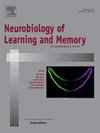The effect of biperiden on episodic memory: Testing the serial position effect
IF 1.8
4区 心理学
Q3 BEHAVIORAL SCIENCES
引用次数: 0
Abstract
Biperiden (BIP), a muscarinic type 1 (M1) receptor antagonist, has been proposed as a pharmacological model for episodic memory impairment in mild cognitive impairment (MCI) and early stages of Alzheimer’s disease (AD). Understanding the effects of BIP on memory could also be relevant for the development of M1 agonists to improve memory. In this study, we specifically examined how BIP affected the serial position effect (SPE) in a word learning task. Since MCI and AD show memory deficits for the first words of a list (primacy effect) we predicted a similar effect for BIP. Data from four previous studies were collated in which the effects of BIP or placebo treatment was tested a double-blind randomized design. For testing the SPE effect, we calculated the average of the first 3 words (primacy), the last 3 words (recency) and the middle 10 words. To control for the level of performance in the different studies, z-scores were calculated. Overall, the analyses revealed a clear SPE effect. BIP did not impair the primacy or recency effect but was found to impair the memory for the middle 10 words in the delayed recall test. These findings indicate that blocking the M1 receptor not does impair the primacy or the recency effect in the SPE. Although BIP treatment has an overall impairing effect on episodic memory, it does not model primacy effect deficits in MCI and AD. However, M1 receptors appear to modulate the memory for weakly encoded/stored information suggesting that M1 agonist could improve verbal episodic memory.
双叶草对情景记忆的影响:序列位置效应的检验
Biperiden (BIP)是一种毒蕈碱1型(M1)受体拮抗剂,已被提出作为轻度认知障碍(MCI)和阿尔茨海默病(AD)早期阶段情景记忆障碍的药理学模型。了解BIP对记忆的影响也可能与M1激动剂的开发有关,以改善记忆。在这项研究中,我们特别研究了在一个单词学习任务中,BIP如何影响序列位置效应(SPE)。由于MCI和AD表现出对列表中第一个单词的记忆缺陷(首因效应),我们预测了BIP的类似效应。对先前四项研究的数据进行整理,其中BIP或安慰剂治疗的效果采用双盲随机设计进行测试。为了测试SPE效应,我们计算了前3个单词(首字母)、后3个单词(近因)和中间10个单词的平均值。为了控制不同研究中的表现水平,计算了z分数。总的来说,分析显示了明显的SPE效应。在延迟回忆测试中发现,BIP不影响首因效应和近因效应,但会损害中间10个单词的记忆。这些发现表明,阻断M1受体并不会损害SPE的原发性或近期效应。虽然BIP治疗对情景记忆有全面的损害作用,但它不能模拟MCI和AD的首因效应缺陷。然而,M1受体似乎调节弱编码/存储信息的记忆,这表明M1激动剂可以改善言语情景记忆。
本文章由计算机程序翻译,如有差异,请以英文原文为准。
求助全文
约1分钟内获得全文
求助全文
来源期刊
CiteScore
5.10
自引率
7.40%
发文量
77
审稿时长
12.6 weeks
期刊介绍:
Neurobiology of Learning and Memory publishes articles examining the neurobiological mechanisms underlying learning and memory at all levels of analysis ranging from molecular biology to synaptic and neural plasticity and behavior. We are especially interested in manuscripts that examine the neural circuits and molecular mechanisms underlying learning, memory and plasticity in both experimental animals and human subjects.

 求助内容:
求助内容: 应助结果提醒方式:
应助结果提醒方式:


